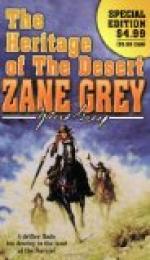The long level of wind-carved rocks under the cliffs, the ridges of the desert, the miles of slow ascent up to the rough divide, the gradual descent to the cedars—these stretches of his journey took the night hours and ended with the brightening gray in the east. Within a mile of Silver Cup Spring Hare dismounted, to tie folded pads of buckskin on Bolly’s hoofs. When her feet were muffled, he cautiously advanced on the trail for the matter of a hundred rods or more; then sheered off to the right into the cedars. He led Bolly slowly, without rattling a stone or snapping a twig, and stopped every few paces to listen. There was no sound other than the wind in the cedars. Presently, with a gasp, he caught the dull gleam of a burned-out camp-fire. Then his movements became as guarded, as noiseless as those of a scouting Indian. The dawn broke over the red wall as he gained the trail beyond the spring.
He skirted the curve of the valley and led Bolly a little way up the wooded slope to a dense thicket of aspens in a hollow. This thicket encircled a patch of grass. Hare pressed the lithe aspens aside to admit Bolly and left her there free. He drew his rifle from its sheath and, after assuring himself that the mustang could not be seen or heard from below, he bent his steps diagonally up the slope.
Every foot of this ground he knew, and he climbed swiftly until he struck the mountain trail. Then, descending, he entered the cedars. At last he reached a point directly above the cliff-camp where he had spent so many days, and this he knew overhung the cabin built by Holderness. He stole down from tree to tree and slipped from thicket to thicket. The sun, red as blood, raised a bright crescent over the red wall; the soft mists of the valley began to glow and move; cattle were working in toward the spring. Never brushing a branch, never dislodging a stone, Hare descended the slope, his eyes keener, his ears sharper with every step. Soon the edge of the gray stone cliff below shut out the lower level of cedars. While resting he listened. Then he marked his course down the last bit of slanting ground to the cliff bench which faced the valley. This space was open, rough with crumbling rock and dead cedar brush—a difficult place to cross without sound. Deliberate in his choice of steps, very slow in moving, Hare went on with a stealth which satisfied even his intent ear. When the wide gray strip of stone drew slowly into the circle of his downcast gaze he sank to the ground with a slight trembling in all his limbs. There was a thick bush on the edge of the cliff; in three steps he could reach it and, unseen himself, look down upon the camp.
A little cloud or smoke rose lazily and capped a slender column of blue. Sounds were wafted softly upward, the low voices of men in conversation, a merry whistle, and then the humming of a tune. Hare’s mouth was dry and his temples throbbed as he asked himself what it was best to do. The answer came instantaneously as though it had lain just below the level of his conscious thought. “I’ll watch till Holderness walks out into sight, jump up with a yell when he comes, give him time to see me, to draw his gun—then kill him!”




